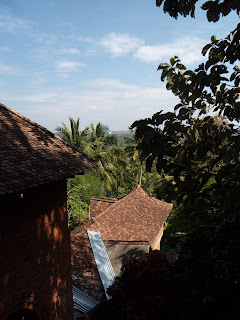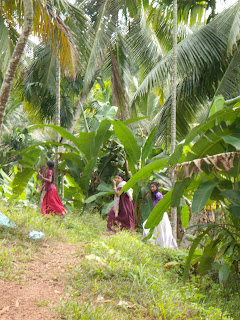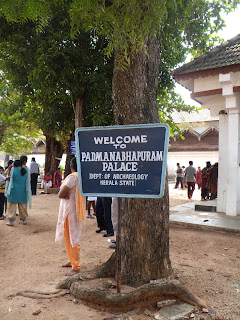Today is just 2 days away from Christmas but it doesn't really feel that way. I have been at my permanent site for exactly a week and think I am adjusting well. It has been very interesting, very hard, and very rewarding all at the same time. I arrived last Friday in Singida town, to two current volunteers who came to town to meet us. The following day I met my mwalimu mkuu (principal of the primary school), my WEO (Ward Executive Officer) and Village Councilor. The three of them came to town to escort me to my new home. When I arrived, I was greeted by what seemed like the entire village. Everyone carried all of my belongings to my house, as the Woman’s Empowerment group wrapped me in their khangas, while singing and dancing around me. From there I was able to briefly look at my house before I was to attend a welcome ceremony at the primary school. I was introduced to the village, given WONDERFUL gifts made by the Woman’s Empowerment group and told to give a short speech. I was also given the Nyaturu (the tribe of my village) name Mwam-bura (which means sent from God during the rain season). So to say in the least I was well received and my village was excited is an understatement. After the ceremony we all had soda and I was allowed to go home to shower before dinner. For dinner, and 2 days since I have had to stomach CHICKEN!! I did it to say Thank You the first day and now even though I explicitly say I don't like meat and I don't like to eat animals I have been served fish and chicken. I am looking forward to returning to my village after Christmas after having gone to the market, able to cook for myself. However, I feel comfortable in the friendships already made and I know any day I don't want to cook I am free to “piga hodi” (knock) and my neighbors will feed me :)
It took me a few days to truly appreciate the warm welcome and the food provided. After coming from America where we have personal space and time to ourselves, and immersing ourselves into the Tanzanian culture, you find personal space and time alone don't exist. Therefore it's something that you look forward to when you finally move to your own home. Once I got here, and still had my neighbors tell me when to wake up, when to eat, when to shower, etc. it was slightly annoying. But once I was able to look past the action and see that they just wanted to help and welcome me, I have been more open and able to appreciate it. And now I appreciate (slightly, haha, I can't lie!) the ugali and makunde (bean and corn mixture), even though I wouldn't mind staying in my home and eating peanut butter out of the tub (because that's all the food I have right now!) Though my village doesn't have electricity or running water, they actually have a great system set up at both the primary and secondary school to catch rain water. The headmaster of the secondary school has solar, and that is the only means of electricity outside of the few people that have generators. I don't mind however because I have been without running water and electricity since I arrived. That's a least one transition that isn't new to me! (I did however buy a solar lamp in Dar es Salaam that charges my cell phone and illuminates my two bedroom house.)
For Christmas I'll be going to town, and then to the village of a volunteer that has been here over a here. So Merry Christmas! I am doing well trying to manage the boredom by writing letters and studying Swahili. My job for the next three months is to fully learn Swahili and assess the needs of my village by conducting a Village Survey Analysis (with villagers, the zahanati (health clinic), village leaders and both the primary and secondary school, and meeting the people I will live amongst for the next 2 years. I must say the kids here help me the most and it is slowly progressing. Tanzanians speak so fast that I am still able to pick up a few words but somehow understand what was said! I am going to the post tomorrow so a few of you can be on the look out in about 10 days! That's all for now! HAPPY NEW YEAR TOO!


































 These two illustrate a bench for kneeling and small windows in the wall used for women to watch events in the dance hall as they were not allowed to be seen by the public. To the right, you can see the dance hall.
These two illustrate a bench for kneeling and small windows in the wall used for women to watch events in the dance hall as they were not allowed to be seen by the public. To the right, you can see the dance hall.





















